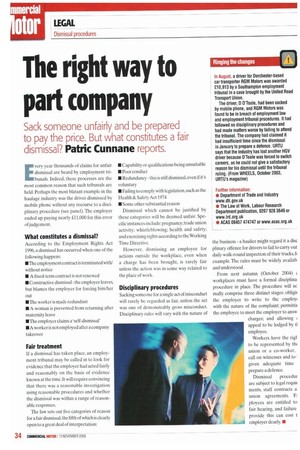The right way to pad company
Page 34

If you've noticed an error in this article please click here to report it so we can fix it.
Sack someone unfairly and be prepared to pay the price. But what constitutes a fair
dismissal? Patric Cunnane reports.
Every year thousands of claims for unfair dismissal are heard by employment tribunals. Indeed, these processes are the most common reason that such tribunals are held. Perhaps the most blatant example in the haulage industry was the driver dismissed by mobile phone without any recourse to a disciplinary procedure (see panel). The employer ended up paying nearly f 11.000 for this error of judgement.
What constitutes a dismissal?
According to the Employment Rights Act 1996, a dismissal has occurred when one of the following happens: • The employment contract is terminated with/ without notice • A fixed-term contract is not renewed • Constructive dismissal the employee leaves, but blames the employer for forcing him/her out • The worker is made redundant • A woman is prevented from returning after maternity leave • The employer claims a self-dismissal' MA worker is not employed after a company takeover
Fair treatment
If a dismissal has taken place, an employment tribunal may he called in to look for evidence that the employer had acted fairly and reasonably on the basis of evidence known at the time. It will require convincing that there was a reasonable investigation using reasonable procedures and whether the dismissal was within a range of reasonable responses.
The law sets out five categories of reason for a fair dismissal. the fifth of which is clearly open to a great deal of interpretation: • Capability or qualifications being unsuitable • Poor conduct • Redundancy this is still dismissal, even if it's voluntary • Failing to comply with legislation,such as the Health & Safety Act 1974 • Some other substantial reason Dismissal which cannot be justified by these categories will be deemed unfair. Specific instances include: pregnancy: trade union activity: whistleblowing: health and safety; and exercising rights according to the Working Time Directive.
However, dismissing an employee for actions outside the workplace. even when a charge has been brought, is rarely fair unless the action was in some way related to the place of work.
Disciplinary procedures
Sacking someone for a single act of misconduct will rarely be regarded as fair, unless the act was one of demonstrably gross misconduct. Disciplinary rules will vary with the nature of the business a haulier might regard it a disc plinary offence for drivers to fail to carry out daily walk-round inspection of their trucks, fi example. The rules must be widely availab and understood.
From next autumn (October 2004) workplaces must have a formal disciplinai procedure in place. The procedure will nc mally comprise three distinct stages: obligit the employer to write to the employ< with the nature of the complaint; permittii the employee to meet the employer to answ charges: and allowing appeal to be lodged by ti employee.
Workers have the fie. to be represented by tht union or a co-worker, call on witnesses and to ' given adequate time prepare a defence.
Dismissal procedur are subject to legal requir ments, staff contracts a union agreements. E ployees are entitled to fair hearing, and failure provide this can cost t employer dearly. •
































































































































































































